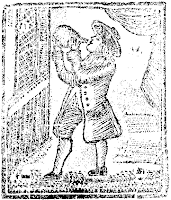“Do something for one of my old Jail Mates”
 After Boston barber Richard Carpenter and Pennsylvania rifleman Walter Cruise got out of British custody around the turn of the year 1777, they went to Baltimore.
After Boston barber Richard Carpenter and Pennsylvania rifleman Walter Cruise got out of British custody around the turn of the year 1777, they went to Baltimore.
Why Baltimore? Because, with the British army cutting rapidly through New Jersey in the fall of 1776, the Continental Congress had moved south from Philadelphia. The political leaders didn’t realize, as so many American schoolchildren have learned since, that Gen. George Washington would win a battle at Trenton and decide the war. (At least that’s how it appears in capsule histories that skip rapidly through the battles from early 1777 through late 1781.)
On 13 Jan 1777 the Congress passed a special resolution about those two men:
That 100 dollars be paid to Walter Cruise, and 100 dollars to Richard Carpenter, who have been long detained prisoners by the enemy, and cruelly treated by them; and that they be recommended to General Washington to be employed in the service of the United States, in such way as he shall think proper.John Hancock as president of the Congress sent that resolution to Washington in a brief note on 15 January. Nine days later, Washington wrote a couple of lines to Col. John Patton asking him to appoint Cruse to a position in the Sixth Pennsylvania Regiment. Cruse retired in June 1778 at the rank of captain.
As for Carpenter, he asked to serve in a Massachusetts regiment, so Washington wrote a letter about him to the Massachusetts Committee of Safety. He apparently carried it home to Boston in February 1777, and then became a second lieutenant in the 15th Massachusetts with his appointment back-dated to 1 January.
Unfortunately, Carpenter seems to have been unsuited for the position. On 5 Oct 1777 James Lovell, by then a Congress delegate, wrote to Gen. Horatio Gates about the man:
I wish for the Sake of a most deserving Woman & lovely young Children, you could contrive to do something for one of my old Jail Mates, now a Lieutenant in yr. Army—Richard Carpenter.Evidently Carpenter had visited Mary Lovell to ask a favor from her husband for old time’s sake. But the barber ended up resigning from the Continental Army on 26 October.
He is bold as a Lion in our Cause; but I have only my Wife's Assertion that he is intirely altered from what he appeared in the days of his Confinement, when non procul atrita pendebat Cantharus ansa [“not far away his flagon hung by its worn handle,” a quote from Virgil about being a heavy drinker—Lovell was a former Latin teacher, after all].
His Orthography is by no means his greatest Recommendation, as you will See by the inclosed. I have given you the only two unfavourable Hints I knew respecting him. If he proves my Wife's account true he is worthy of yr Notice, and I will own myself his Friend.
TOMORROW: I wish I could say this ends happily.

No comments:
Post a Comment